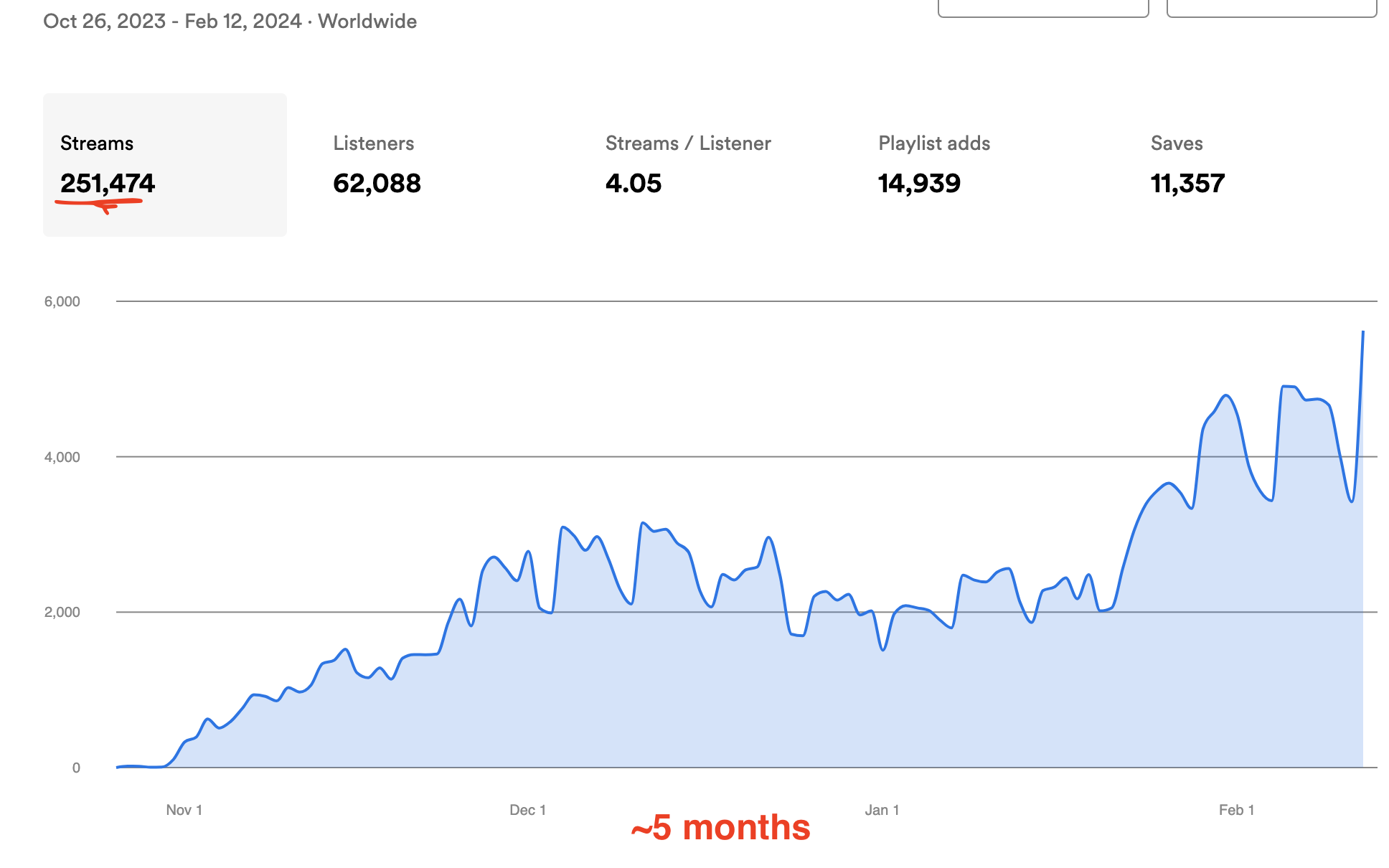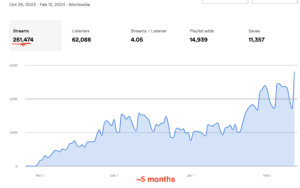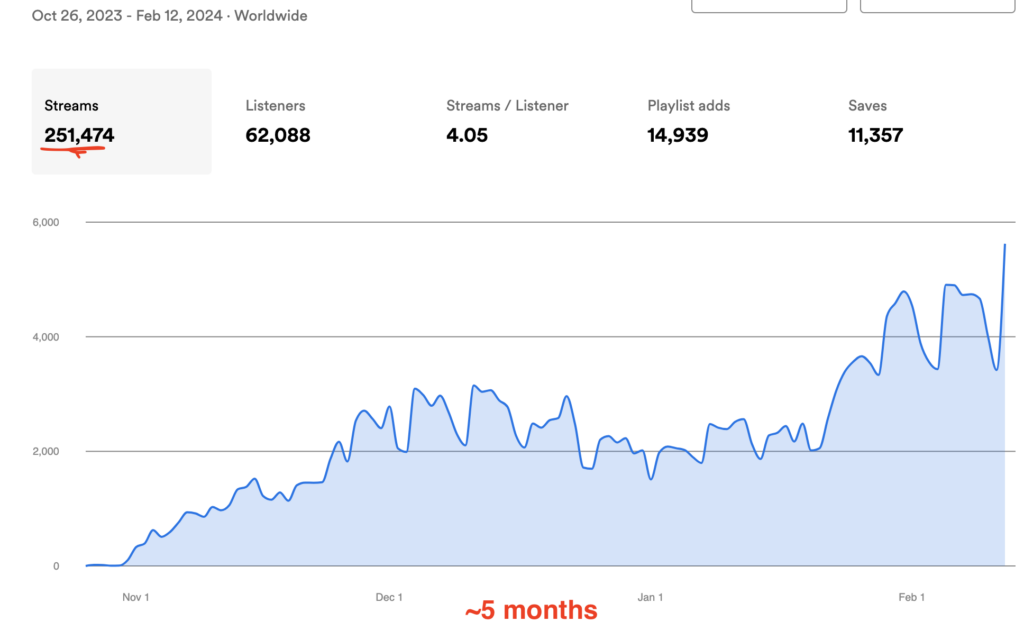For every musician trying to maximize their audience, Spotify is a crucial tool that can’t be neglected. Getting your music on Spotify’s playlist is one of the best methods to increase the number of your streams and have more monthly listeners and followers. But which is the best playlist to be featured on Spotify? And how can we find them?
Let’s begin by explaining the different types of Spotify playlists where your music can be featured: Personalized playlists, Editorial playlists, and Listener playlists. Let’s take a look at each one before moving on.
The personalized playlist includes Discover Weekly, Release Radar, Daily Mix, On Repeat, and Repeat Rewind. These playlists are different for each user, and the chances that your music is featured will depend on the user’s previous interaction with your music or similar artists. You cannot pitch to these playlists as they rely on Spotify’s algorithm.
Spotify’s editors curate the Editorial playlists; you can pitch your music to them, but it takes more work to get a spot on them. Labels or bigger organizations create other playlists, but same as with the Editorial playlists, you’ll need to pitch them and hope to get a spot, which leads us to the last type of playlist.
Listener’s playlists are independent playlists created by Spotify users. These playlists are a fantastic opportunity to connect with more fans. You will find millions of independent playlists, many with thousands of followers, which makes them your best shot to promote your music if you have just started.
Most independent playlist curators will receive submissions directly from artists or labels if it fits the genre. This practice is beneficial for both the artist and the playlist curator: you get your music on a popular playlist, and by sharing it with your fans and followers, the playlist reaches more listeners.
Be aware of fraudulent playlists, where curators ask for money and promise you a spot in their playlists that’ll generate a huge number of streams. This is totally against Spotify’s terms and conditions.
What is a playlist finder?
Searching for independent playlists and their owner’s information to submit your music can be hard and require a lot of time that you’d rather spend creating more music or promoting it. Playlist finders are here to make that task less stressful.
Playlist finders are tools for artists to help them find independent playlists to pitch their music to. They also provide the owner’s contact information so you can message them directly. Some playlist finder tools can create a comprehensive directory of curators, offering these catalogues to artists for a price.
Let’s take a look at what these tools offer. They are not asking for payment to place your music on the playlist; they only provide the contact information, some even help you pitch playlists, but they do not guarantee any placement.
The playlist finders we’ll review in today’s article will help you avoid the struggle of searching and pitching playlists on your own or being scammed.
Soundplate Spotify Playlist Search
Soundplate is a music technology service that develops resources for musicians and managers to promote music. They have tools for crowdfunding campaigns, smart links, a music visualizer creator, a cover artwork generator, a job search, and a playlist finder.
Soundplate’s Playlist search allows you to search by genre, curator, or keyword and find the independent playlist you’re looking for. You can explore each playlist and review the tracks included to see if your music will fit.
With Soundplate, you don’t have access to the curator’s contact information like on other playlist finders, but you can submit to that playlist directly, and your request will reach the playlist curator, who then will either approve or reject your music. The downside is that you can’t create a more personalized message for the curators.
One of the great features of Soundplate is a playlist analyzer to scan the playlist to look at the average tempo, duration, song key, number of followers, and genre. You can then analyze your own track with the track analyzer to see if it’s a good match.
Soundplate is free for artists who wish to submit their songs to playlists. Curators are currently being charged a $15 fee to add a playlist to their database due to high demand. However, the curator receives a refund if the playlist fails to pass the editor’s review.
Pros
- Free playlist submission.
- Spotify playlist and track analyzer.
- You can search by genre, curator, or keyword.
- You can directly submit a song to a playlist with Soundplate as an intermediary.
Cons
- Limited submissions per day.
- You cannot personalize your pitch.
Artist Tools
Artist Tools is a marketing solution to search for Spotify playlists and all the essential data to find the right ones for your music genre, making it easy to pitch your song to independent playlist curators. With Artist Tools, you can choose between more than 60,000 playlists with available contact information.
Search by keyword, genre, or artist name and get the best results. Artist Tools provides accurate information to make contact and submit your tracks to the playlist’s owners, which helps avoid scammers and bot playlists.
By providing a keyword and a market, Artist Tools will track the historical keyword ranking in a playlist to find out the position of that keyword in a specific country. Artist Tools will also offer top-quality insights such as listener counts, bot identification, and daily historical growth graphs.
Artist Tools used advanced filters to narrow the playlist search by size, location, and preferred contact method. You can also choose which quality playlist you want on your search result, eliminating poor quality or ineffective playlists to get the most out of your research. It’s always up-to-date, and playlist data is retrieved in real-time, updating the information every 24 hours.
Artist Tools obtains up-to-date information from Spotify’s API for every search. You are contacting curators at their most current contact information; if they change their personal information, Artist Tools will update it accordingly.
All in all, Artist Tools offers the possibility to find and connect with a playlist curator who accepts submissions in line with your genre.
Artist Tools has two different subscription plans and is working on a third one for enterprises, managers, or labels.
- Limited Access. The free forever subscription gives you unlimited search, playlist, curator analysis, search filters, and seven days of historical data.
- Full Access. This plan is $15 per month, including everything on the Limited Access plus a complete historical database, contact detail on over 60k playlists, scam analysis, insights, real-time updates, and 24h curator growth monitoring.
- Enterprise. This plan is still in development and can be customized to your needs. It will be available for $250 per month, including everything from Full Access plus monitor and alerts for fraudulent playlists, exportable lists, custom reports, and custom API.
Pros
- Subscription price.
- Scam and fraud data.
- Quality check for a specific Spotify playlist.
- Insights on playlist data.
- Alerts for suspicions playlist.
- Referral program.
Cons
- You need to upgrade to see the curator’s contact information.
- It does not offer a free trial to try the upgrade features.
PlaylistSupply
PlaylistSupply analyzes public playlists and compiles all the details you need to launch a Spotify playlist promotion campaign. With PlaylistSupply, you can target the right playlists and reach more listeners to stream your music on release days.
PlaylistSupply was developed to help managers and artists avoid engaging with fake playlists, providing a search engine in real-time for niche genres and specific keywords. It delivers crucial data for your campaigns to attract new fans, streams, and traffic to your artist page.
With each search in PlaylistSupply, you’ll get the best quality results on authentic independent playlists with active and legitimate listeners and playlist data, including the owner’s name and contact information and the number of followers. Its user interface is easy to use, so you can improve your workflow and focus on targeting the best playlists.
PlaylistSupply knows how hard it is to pitch to curators, so they’ve come up with the Contact Finder feature, where you can search for a particular playlist curator’s email or social media contact information.
The reviewing process of PlaylistSupply is strict: they keep artists safe by removing any songs added to fake playlists and flagging them.
The playlist directory is one of the best features on PlaylistSupply, allowing you to have access to a contact list of the playlists you like based on the number of followers and popularity. Unlike buying a physical or digital contact list, you’ll always receive the updated information.
PlaylistSupply is highly popular among managers and licensing services. Some music industry companies using PlaylistSupply are Universal Music Group, Maverick, Create Music Group, and Live Nation, among others. If you still have doubts about them, they have a testimonials page full of reviews and familiar faces talking about the tool.
PlaylistSupply uses a subscription model with a single plan. For only $19.99 per month, you have access to all the features of the service:
- A complete playlist analysis with name, link, live follower count, info text, and playlist popularity rank.
- A Contact Finder that provides name, profile link, email address, and social media contact information from the playlist’s curators.
Pros
- Dedicated playlist directory.
- Filtering data and search results.
- Exporting custom reports.
- Price for value.
Cons
- It does not offer a free plan or trial.
- You still need to do the pitching yourself.
Playlist Map
Playlist Map is a tool that allows you to reach the right playlists for your music and a wider audience. It connects you with over 100,000 playlist curators across more than 5000 genres. Searching by artist, music genre, and other advanced keywords, you will find playlists suitable for your sound on one of the largest Spotify playlist databases.
Something particular about Playlist Map is that you won’t see the curators’ information on your search; you will need to unlock this service using the credits available from your subscription plan. Unlocking will grant you access to a playlist curator’s name, email address, and social media profiles.
Playlist Maps does not submit your music for you, but it gives you all the tools to do it on your own: a search engine, contact information, and customizable templates to pitch playlist curators. With Playlist Map, you can streamline your submitting process, research relevant playlists, create the pitch, connect with curators and start distributing your music worldwide.
Playlist Map takes care of fake streams and other fraudulent activities like other playlist finders. They investigate each playlist in their database to offer you a curated list with genuine playlists.
Playlist Map offers different plans with several credits per plan, which allows you to unlock the curator’s contact information.
- The Free plan includes three monthly credits, five daily searches, and limited results.
- Basic includes 20 credits, unlimited searches, five email templates, and customer support for $8.99 per month.
- Plus is $13.99 monthly and includes 50 credits, unlimited searches, 20 email templates, and customer support.
- Premium includes 100 credits, unlimited searches, 20 email templates, and customer support for $19.99 monthly.
Pros
- An extensive library of more than 100,000 playlist curators.
- Email templates.
- Reasonable price.
Cons
- The Unlock per credit system can be limiting.
Playlist MatchMaker
TMJ Software developed playlist MatchMaker to help artists save time searching for an independent playlist to pitch their music. The teams know how hard it is to find that information on Spotify, so they created Playlist MatchMaker to help connect curators and artists.
Playlist MatchMaker has created a search engine that delivers playlists and the owner’s information by registering the playlist curators on their website. However, this information will not be visible in your results until you pay to see it. The price can vary depending on popularity and followers. For playlists with 50 to 500 followers, the price starts at $0.02.
The data that you get for free comes directly from the Spotify database or public domain. Playlist MatchMaker is only helping you narrow down your search with more refined results.
Playlist MatchMaker has two main search tools:
- Spotify playlist finder is built for artists to find a playlist, the playlist’s owner’s name, the number of tracks in the playlist, and the number of followers.
- Spotify song finder. Built for curators to search for a defined style and find the most popular songs and artists with more followers working in that genre to contact them to add their music.
Pros
- Pay for the contact information you want.
- Prices according to playlist popularity.
- You can download your search results.
Cons
- Its narrow search might omit many interesting playlists, though these are usually the ones with 50 or fewer followers.
- Many results miss direct contact information.
Final words
If you need help getting your music out, using these playlist finders will change the way you interact with tastemakers. Think of them as a means to meet future collaborators or fans!
If you don’t feel confident enough to contact curators directly, you can try Soundplate, and they’ll send your request to the curators. If you’re on a low budget, you can opt for Playlist Map or Playlist MatchMaker. And if you want more quality in your search, then either Artist Tools or PlaylistSupply are your best shots.









